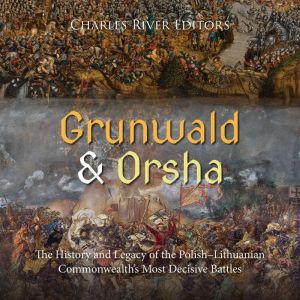
List: $7.95
| Sale: $5.57
Club: $3.97
Grunwald and Orsha: The History and Legacy of the PolishLithuanian Commonwealth's Most Decisive Battles
Author: Charles River Editors
Narrator: Jim Walsh
Unabridged: 2 hr 55 min
Format: Digital Audiobook Download
Publisher: Charles River Editors
Published: 01/25/2024
Category: History - Medieval
Synopsis
Like other secretive groups, the mystery surrounding the Teutonic Knights has helped their legacy endure. While some conspiracy theorists attempt to tie the group to other alleged secret societies like the Illuminati, other groups have tried to assert connections with the Teutonic Knights to bolster their own credentials. Who they were and what they had in their possession continue to be a source of great intrigue even among non-historical circles. While the military orders are now often tied to religion or conspiracy theories, they did once wield great power and influence in Europe, and their actions had consequences centuries after they had reached their peak. This was made clear in the wake of a major battle fought between German and Russian forces from August 26-30, 1914 during the First World War. It occurred in Masuria, a region of marshes, woodland, and numerous lakes in northern Poland, almost 400,000 men were involved, and it was a decisive victory for the Germans, who annihilated the Russian army. The Germans named the battle after Tannenberg (Polish Stebark), and the battle, though widely fought over 100 miles, did indeed encompass the village, but there was a historical reason for assigning the name to the battle. On July 15, 1410, Tannenberg was the site of another decisive battle between the army of the Germanic Teutonic Order and that of Poland-Lithuania, a battle now commonly referred to as the Battle of Grunwald (after another nearby village). In 1514, Orsha was a much smaller town, home to a population of no more than 5,000 as part of the Grand Duchy of Lithuania, but on September 8 of that year, the normally quiet and unpretentious town was thrust into the world’s gaze when over 100,000 troops engaged in one of the 16th century’s biggest battles outside the town walls. The battle pitted the forces of the King of Poland and the Grand Duchy of Lithuania against the Grand Duchy of Moscow.